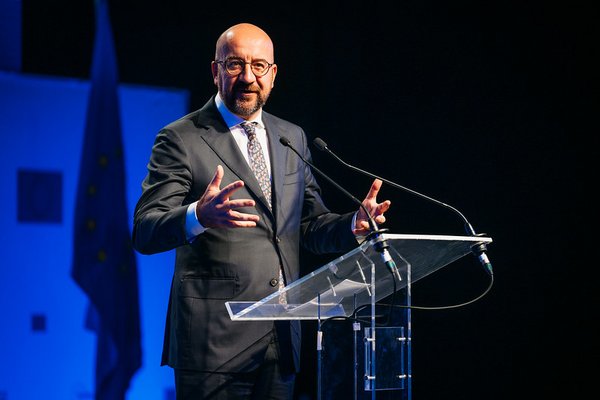 Read this article in French
Read this article in French- Share this article
- Subscribe to our newsletter
EDDs – sustainable partnerships for a connected world
This year’s edition of the European Development Days (EDD) focused on the EU’s Global Gateway strategy, it took place on the 21st and 22nd June 2022 in Brussels/Belgium and online. During the event, participants could take part in more than 90 sessions, including high-level panels, around the five key themes of the Global Gateway: digital, climate and energy, transport, health, and education and research. The Global Village allowed participants to showcase innovative projects related to the EDD's themes and share experiences in their initiatives.
“This is the place where Europe meets the global development community and partners from all corners of the world,” European Commission President Ursula von der Leyen said in her welcome speech at the opening Forum. “Global Gateway is Europe's offer to a world that needs massive investment. It aims at mobilising EUR 300 billion by 2027, with EUR 150 billion of this in Africa.”
“The only way to be safe is being together,” EU Council President Charles Michel quoted the South African Anglican bishop and human rights activist Desmond Tutu and pointed to the devastating impact of the COVID-19 pandemic and the Russian war of aggression against Ukraine on food security in several African countries. Michel stressed that the EU was standing with the African Union.
EU offers support in response to Russia's invasion of Ukraine
At the European Development Days, von der Leyen announced new support measures to strengthen food security. The European Commission has adopted a proposal to mobilise EUR 600 million from the reserves of the European Development Fund to address the current food security crisis aggravated by Russia's invasion of Ukraine. These funds will support African, Caribbean and Pacific (ACP) countries to cope with the dire situation through humanitarian assistance (EUR 150 million), sustainable production and resilience of food systems (EUR 350 million), as well as macro-economic support (EUR 100 million).
Regreening Africa and the Great Green Wall
“The Great Green Wall has already retaken millions of hectares of land from the desert, boosting food production from Senegal and Niger to Ethiopia. Roughly 15 per cent of the project has been completed. Global Gateway will put another brick in the green wall, as a bulwark against food insecurity and climate change,” von der Leyen said in her speech at the opening ceremony.
At the Regreening Africa and the Great Green Wall session, organised by the World Agroforestry Centre, participants shared insights in Africa’s great land restoration effort. They highlighted evidence of progress and lessons learnt related to matching practices to local contexts, the importance of monitoring and learning, policy engagement, youth and women inclusion and value chains. Moreover, they discussed how the evidence and lessons from Regreening Africa, and other successful efforts could be interconnected and applied to future restoration initiatives and investments such as the Great Green Wall.
Mieke Bourne, Regreening Africa Programme Manager of the World Agroforestry Centre (CIFFOR/ICRAF), pointed out that there is no single silver bullet to achieve progress. Therefore it was very important that practices matched with the local context. Drivers of degradation as well as incentives of restoration had to be addressed, while incentives could come in different forms, for example as usage rights.
A “mosaic of intervention” was needed, added Bernard Crabbé, Team Leader Environment and Circular Economy at the European Commission – Directorate-General for International Partnerships, pointing out that subsidiarity was crucial.
Birguy Lamizana Diallo, Senior Programme Officer at United Nations Convention to Combat Desertification showed lessons learnt from the 2020 GGW Implementation report that identified several challenges, including governance, monitoring and reporting, and funding. To tackle these challenges and foster the regreening in the Sahel region, the Great Green Wall Accelerator was implemented in 2021.
Food security in time of crisis
At the event Food security in time of crisis, organised by the French Ministry for Europe and Foreign Affairs, Chrysoula Zacharopoulou, French Minister of State for Development, Francophonie and International Partnerships, talked about the Food and Agriculture Resilience Mission (FARM) initiative for food security in the most vulnerable countries that had been launched in March 2022 by French President Emmanuel Macron, in conjunction with the European Union, the G7 and African Union partners.
The FARM initiative is based on three pillars:
- Trade: to ease tensions on the agricultural markets, guarantee full transparency on flows and stocks and combat unjustified trade barriers,
- Solidarity: to support Ukraine’s agricultural capabilities, ensure access to agricultural commodities at reasonable prices in the countries most affected, and prepare to alleviate the war’s effects on the level of agricultural production,
- Production: to strengthen agricultural capabilities sustainably in the countries most affected.
Ines Lechner, editor, Rural 21, DLG-Verlag GmbH, Frankfurt/Main, Germany
More information:
Visit the European Development Days Website
More information on the Global Gateway Initiative at the website of the European Commission
More information on the FARM initiative
Visit the Great Green Wall website
More information on Regreening Africa at World Agroforestry Center website


